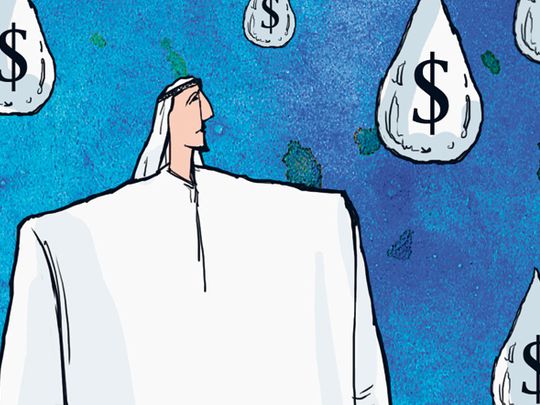
Kuwaiti politics has once again found its way into the pages of the Financial Times and Wall Street Journal. As recently as December 2008, Kuwaiti parliament members made headlines because they voted against the government and walked away from a multi-billion dollar joint venture with the US Dow Chemical Company.
Perhaps the fact that Kuwait has one of the highest GDPs per capita explains why a country with a footprint the size of the state of New Jersey or Wales in the UK is so highly charged and overly politicised.
As economic weakness persists and elections draw closer, the rhetoric has gathered momentum over the past 12 months, resulting in a parliamentary proposal to restructure a significant portion of Kuwaiti consumer debt.
Conversations with fellow Kuwaitis from various backgrounds and with differing levels of wealth highlight the disparity of viewpoints. Some individuals who stand to gain believe that eliminating interest and extending the maturity of the debt is both needed and in fact their right as Kuwaiti nationals. They feel they deserve to benefit directly from the near $80 (Dh294) per barrel oil price.
Others, even some of those who would benefit if the bill passed, have taken a less receptive stance and believe that people are shying away from their responsibilities and should learn to live with the consequences of the decisions they made, perhaps mistakenly. Regardless of whether or not the draft law passes, there are intriguing aspects to Kuwait's current dilemma.
The tumultuous nature of the lawmaking process has drawn attention once again to a remarkable feature of Kuwait's constitutional monarchy: freely elected members of parliament are able to propose and vote on bills.
The Emir of Kuwait has veto power, although this can be overturned by a two-thirds majority in a second vote by members of parliament.
It is crucial to question why Kuwaitis are in this financial situation. Many I speak to make reference to the period of easy lending when billboards along most highways sported three-metre-high adverts for personal loans of up to 70,000 Kuwaiti dinars (Dh840,000) from a plethora of local banks.
I recall being repeatedly offered a loan upon each visit to my bank. And having entertained an enthusiastic branch employee one afternoon, I soon came to realise how poorly explained the terms of these arrangements were.
There was no talk of interest rates changing, taking only as much as I needed and not one fil more, nor insurance to protect me from missing payments in the case of redundancy or any other crucial points that any borrower should fully understand before signing on the dotted line; I did not take the loan.
Lack of oversight
True, lending regulations were in effect, but scepticism surrounds the degree of their adherence and efficacy. The Central Bank of Kuwait has some good economic reasons for resisting any changes to the laws governing the interest terms of these debts, but one could easily point the finger at them and blame poor initial regulatory oversight for much of the mess we now face.
Debt is an interesting phenomenon. The best the lenders can hope for is to get their money back with some interest. Borrowers have no assurance that they will be able to return the money having generated adequate income to cover the additional cost of interest.
In the worst case scenario, the outcome is very asymmetric, and the rule of law is vital to allowing this process to occur, whether the outcome is harmonious or not.
As societies develop and evolve, we need to ensure that we learn from our mistakes. Most Kuwaitis have an income that allows a certain level of borrowing, but we must understand that borrowing by definition implies that the money needs to be returned at some point, in full, plus interest.
Amongst the chatter sweeping Kuwaiti society, naive comments have been made accusing the wealthy trading and merchant classes of not wanting to see the less well-to-do benefit from a debt relief package.
I don't see how this holds weight as the merchant families stand to gain the most in absolute monetary terms given their dominant ownership of retail businesses that will surely see increased sales from reinvigorated consumers.
Further, the owners of the various banks whose bad loans were bought by the government would also benefit, since cleaner balance sheets would allow them to take on new opportunities.
I'd like to see more emphasis on the need to better manage centralised and shared databases of consumer credit histories. This service would not only provide a reference point for the evaluation of future lending, but in many ways also act as a deterrent because borrowers would make a conscious effort to keep their credit histories clean and their long-term cost of borrowing low.
These self-reinforcing processes are often overlooked, but are crucial components of the measures that need to be adopted to reduce the likelihood of us finding ourselves again in the same situation down the road.
If astute regulatory changes are implemented in tandem with a debt restructuring for those worst affected, then this would be good public policy. Social goodwill, short-term consumer confidence and a healthier banking system are all potential outcomes.
Blanket statements are never a good approach to deriving economic policy. We're an intelligent people and I hope this is reflected in our laws. As has been said many times before, it's a shame to let a good crisis go to waste.
Ali Al Salim is a Kuwaiti businessman based between the Gulf and London.








